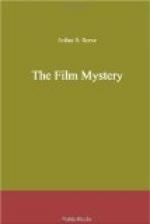Doctor Blake turned to Kennedy the moment we left the library.
“Do you feel it is necessary for me to remain any longer?” he asked. He was apologetic, yet distinctly impatient. “I have neglected several very important calls as it is.”
Kennedy and Mackay both hastened to assure the physician that they appreciated his co-operation and that they would spare him as much notoriety and inconvenience as possible. Then the three of us hurried across and to the little den which had been converted into a dressing room for Stella’s use.
Here were all the evidences of femininity, the little touches which a woman can impart to the smallest corner in a few brief moments of occupancy. It was a tiny alcove shut off from the rest of the living room by heavy silk hangings, drawn now and pinned together so as to assure her the privacy she wished. The one window was high and fitted with leaded glass, but it was raised and afforded the maximum of light. Stella’s traveling bag sprawled wide open, with many of her effects strewn about in attractive disarray. Her suit, in which she had made the trip to Tarrytown, was thrown carelessly over the back of a chair. Her mirror was fastened up ruthlessly, upon a handsome woven Oriental hanging, with a long hatpin. Powder was spilled upon the couch cover, another Oriental fabric, and her little box of rouge lay face downward on the floor.
As we pulled the curtains aside I caught the perfume which still clung to her clothes in the library beyond. As Mackay sniffed also, Kennedy smiled.
“Coty’s Jacqueminot rose,” he remarked.
With his usual swift and practiced certainty Kennedy then inspected the extemporized dressing room. He seemed to satisfy himself that no subtle attack had been made upon the girl here, although I doubt that he had held any such supposition seriously in the first place. In my association of several years with Kennedy, following our first intimacy of college days, I had learned that his success as a scientific detective was the result wholly of his thoroughness of method. To watch him had become a never-ending delight, even in the dull preliminary work of a case as baffling as this one. Mackay also seemed content just to enact the role of spectator.
Kennedy thumbed through the delicate intimacies of her traveling bag with the keen, impersonal manner which always distinguished him; then he found her beaded handbag and proceeded to rummage through that. Suddenly he paused as he unfolded a piece of note paper, and we gathered around to read:
My dear Stella: Have something very important to tell you. Will you lunch Tuesday at the P. G. tearoom? Larry.
“Tuesday—” murmured Kennedy. “And this is Monday. Who—who is Larry, I wonder?”
I hastened to answer the question for him. It was my first opportunity to display my knowledge of the picture players. “Larry—that’s Lawrence, Lawrence Millard!” I exclaimed. Then I went on to tell him of the divorce and the circumstances surrounding Stella’s life as I knew it. “It—it looks,” I concluded, “as if they might have been on the point of composing their differences, after all.”




